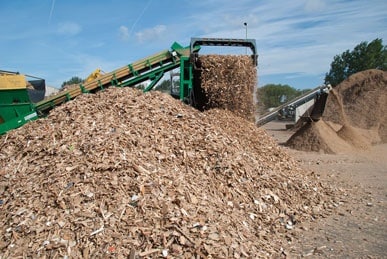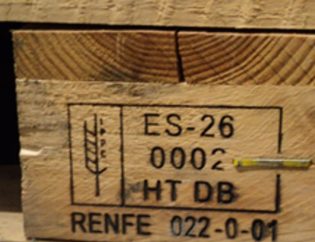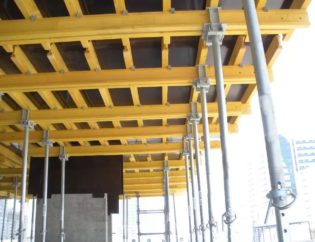
By Jennifer McDowall –
In 2015, following a series of fires at waste and recycling yards, the Environment Agency (EA) released revised fire prevention guidelines for the storage of combustible materials in order to reduce the incidence of fire at such sites.
Developed in collaboration with the Department for Environment, Food & Rural Affairs (Defra), the new guidelines for the production of fire prevention plans (FPPs) was released in March 2015, though they were controversial when released and raised a number of comments, especially from those in the wood recycling industry.
Hadfield Wood Recyclers, one of the largest wood treatment companies in the country, shut down its sites in Manchester and Middlesbrough for four months in July 2015 after the EA threatened to enforce new guidelines, which the company claimed were ‘completely unworkable’.
The EA opened a consultation on the FPP guidance, during which comments and ‘proposals for change’ were invited from members of the industry.
On 29 July this year, following the closure of the consultation in March, the EA released the updated version of the guidelines (FPP v.3) to which all operators must adhere in order to obtain an EA permit for the storage of combustible waste.
Enhanced measures to prevent self-combustion
The EA’s FFP guidelines apply to all operators that store any amount of combustible waste, excluding those treating and/or using biowaste, such as anaerobic digestion plants, and landfill sites.
The guidelines dictate that each operator should have an FPP in place, which should be in a known place, where staff can access it at any point, especially in the incident of a fire.
A correctly filled out FPP should contain the activities on a particular site, all potential causes of fire and safety measures in place to reduce the risks, which should include those advised in the guidelines, according to the EA.
The new guidelines differ mostly from the original technical guidance note (TGN7.01) ‘Reducing fire risk at sites storing combustible materials’ in that they include enhanced measures to prevent self-combustion.
The rotation of stockpiles, previously recommended, is now required every three to six months to minimise the development of hotspots within stacks, which can lead to combustion. In addition, burn times for wood have been reduced to a maximum of four hours.
A list of maximum storage times are listed for different materials with the maximum being six months and the maximum height for wood stacks has been severely reduced from 10 metres to four metres.
Commenting on the release of the revised guidance, Nicky Cunningham, Deputy Director of site-based regulation at the EA, said: “Waste fires can harm the environment, affect the health of residents living nearby and impact on critical infrastructure such as roads and railway lines. Our new guidance is part of our ongoing efforts to decrease major waste fires and reduce their impact.”
Permitted wood pile sizes have been reduced by the FPPIssues raised ‘not taken into account’
The revised guidance has met with further opposition from some parts of the wood recycling sector, though, with some claiming that there is no scientific backing for aspects of the guidelines, such as the four-hour burn time, the requirement for stocks to be rotated every three to six months and the reduction in stack sizes.
The Wood Recycling Association, (WRA) says that the six month maximum storage time does not take into account the seasonality of materials such as wood and that no flexibility is offered to deviate from the set standards even when additional fire safety methods are put in place.
According to the WRA, the revised guidelines are worse than previous ones for workers in the wood recycling sector, which makes it difficult for certain companies to continue to operate.
Response from the EA
Responding to the accusation that the EA has no scientific reasoning for some of the changes, a spokesperson for the agency said: “The FPP guidance has been informed by our own waste fire incident response data. The guidance has been peer reviewed by Building Research Establishment Global fire experts to ensure it is robust. Once the WISH fire tests have been independently peer reviewed, we will consider whether they provide new information which would merit a further revision of the FPP guidance”
The EA says that it has taken consultation responses on board and reviewed themes such as ensuring the approach is proportionate, risk based and associated costs/ benefits of implementing the guidance are assessed. Findings from the consultation process will be published alongside an independent review of the key standards and a summary of the EA’s data.
WRA ‘extremely disappointed’
Andy Hill, Chairman of the WRA, commented he is “extremely disappointed” with the new guidelines which he says have changed very little for wood recyclers, adding: “We sincerely hope that local officers will have been empowered and trained effectively to allow them to assess bespoke permits on the merits of each individual operation. This flexibility will be essential if our country is to continue to enjoy such high wood recovery from landfill.
“We believe prevention combined with high standards of site management and the ability for operators to quickly isolate material to cut off the fuel supply in the event of a fire, is the key to preventing fires and reducing their impact.
“With the right measures in place we would like to see the allowance of larger stack sizes in bespoke permits. Our fear, however, is the new standard rules guidance has introduced even tighter measures meaning the move from these to what may be required for bespoke permits – on sites with excellent management – is too big a leap.
“To date the approval of bespoke permits has been flawed and several are still awaiting permission more than 12 months after being submitted. This uncertainty is simply unacceptable, particularly for the biomass sector which will realise a 25 per cent uplift in end-user demand over the next two years with an additional 1.3 million tonnes of power plant capacity being built now.”
New guidance caused Hadfields to shut for the first time
Speaking to Resource in December 2015, George Hadfield, Managing Director of Hadfield Wood Recyclers commented on the changes to the FPP guidance and the effect it would have on business, saying: “Despite us spending £250,000 over the past 18 months ensuring our sites are compliant and safe, we have still not managed to get our ‘superior’ plan approved by the EA, even though it has been accepted by the local fire service.
“The concern now is not just for our business: I know of many others who store combustible materials such as wood, tyres and paper, who will face the same problems as FPP is increasingly enforced across the country. The industry has been inundated with people saying this will put them out of business and that they feel they are being treated unfairly.
“In its current form, the new FPP guidance is totally unworkable for any large-scale operator. If this guidance remains in place, businesses up and down the UK will be forced to close because they simply won’t be able to operate legally. This can’t be the outcome that the EA wants, so I’m sure some common sense will prevail soon. “
Vietnam Plywood
Vietnam Film Faced Plywood










